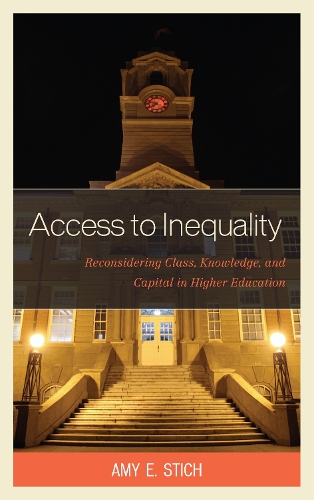
Access to Inequality: Reconsidering Class, Knowledge, and Capital in Higher Education
(Paperback)
Publishing Details
Access to Inequality: Reconsidering Class, Knowledge, and Capital in Higher Education
By (Author) Amy E. Stich
Bloomsbury Publishing PLC
Lexington Books
16th May 2014
United States
Classifications
Professional and Scholarly
Non Fiction
Higher education, tertiary education
Population and demography
Social classes
306.4320973
Physical Properties
Paperback
148
Width 155mm, Height 229mm, Spine 11mm
231g
Description
Set against the backdrop of democratization, increased opportunity, and access, income-based gaps in college entry, persistence, and graduation continue to grow, underlining a deep contradiction within American higher education. In other words, despite the well-intended, now mature process of democratization, the postsecondary system is still charged with high levels of inequality. In the interest of uncovering the mechanisms through which democratization, as currently conceived, preserves and perpetuates inequality within the system of higher education, this book reconsiders the role of social class in the production and dissemination of knowledge, the valuation of cultural capital, and the reproduction of social inequalities. Drawing upon the authors year-long qualitative research study within one democratized institution of higher education and its associated art museum, Access to Inequality explores the vestiges of an exclusionary history within higher education and the art worldtwo related contexts that have arguably failed to adequately respond to the publics call to democratize.
Reviews
Stich has a well-defined remit that assists in her analysis of some contemporary practices in parts of North American higher education: she is also a very talented writer. Her title appears a deliberately provocative response to the now-familiar question access to what The answer she sets out is a chilling one for liberal-minded educators (amongst whom I often include myself) but perhaps not so surprising for those who try to take a strongly reflexive sociological view of higher education in their research (amongst whom I also include myself). . . .What is even more impressive is her capacity to oscillate back and forth between system-level features and the most micro of everyday social processes. . . .I would argue that Access to Inequality already provides powerful justification for more radical action in terms of admissions, perhaps drawing lessons from affirmative action policies. * British Journal of Sociology of Education *
Access to Inequality is a passionate and lyrical account of the workings of class and privilege in higher education. Beautifully written, it constitutes both a carefully considered, reflexive ethnography of access to elite knowledge and a powerful call for real democratization of our universities. -- Diane Reay, University of Cambridge
Amy Stichs Access to Inequality: Reconsidering Class, Knowledge, and Capital in Higher Education is the most original and important book on knowledge and power I have read in recent years. Here, Stich demonstrates the ways collegesin particular, less elite comprehensive schoolsare using art programs and museums to 'open up' privileged knowledge to broader communities. Stich puts us at the center of the resulting tensions and complexities, illuminating a discussion of cultural capital with stunning and nuanced ethnographic detail. This is a masterful intervention. -- Greg Dimitriadis, University at Buffalo, State University of New York
Author Bio
Amy E. Stich is a postdoctoral research associate at the University at Buffalo, State University of New York.
